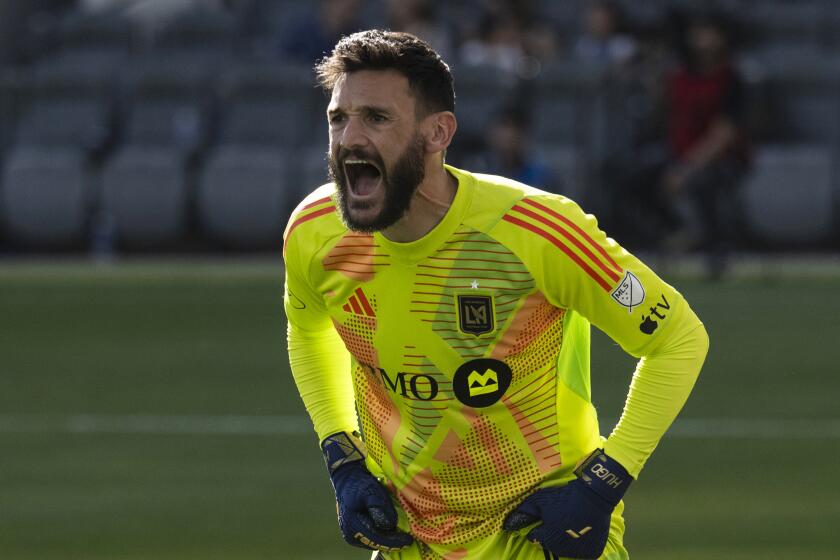Column: For Carlos Cordeiro, the real work starts after winning U.S. Soccer presidency
- Share via
Reporting from ORLANDO, Fla. — Winning the election for the presidency of U.S. Soccer may prove the easy part for Carlos Cordeiro, the former Goldman Sachs executive who beat a field of seven candidates Saturday to take the reins of a sport riven by divisions.
Now comes the hard part: governing that sport and healing those fractures, which have grown following last year’s World Cup qualifying failure and a bruising three-month campaign in which Cordeiro, U.S. Soccer vice president, was repeatedly criticized as an establishment candidate wedded to the status quo.
“For those who didn’t vote for me, I’m going to have to work even harder to convince them I am going to be a good president,” Cordeiro said. “You will see over the next couple of years a much more engaged leadership, a board that actually is taking responsibility.
“We’re only as strong as the team is. I think we can do a lot better.”
Cordeiro succeeds the longest serving president in USSF history, Sunil Gulati, who did not run for reelection after serving three four-year terms.
At 61, Cordeiro was both the oldest candidate in the field and the only one who didn’t play soccer beyond high school. Yet it was the 12 members of the athletes’ council, voting as a block after meeting deep into the night Friday, who put him over the top.
The election was held in a massive ballroom of the Renaissance hotel near the entrance to Orlando’s Sea World amusement park. More than 570 voters representing different constituencies within the USSF were eligible to vote using electronic keypads, but the ballots were weighted differently. The athletes’ council, for example, accounted for 20% of vote although just 12 people cast ballots.
“It wasn’t an easy decision,” said Stu Holden, a former World Cup player and a member of the athletes’ council. “We found a candidate in Carlos that we felt that we could unite behind.”
Also throwing their weight behind Cordeiro were many voters on the pro council, representing MLS, the National Women’s Soccer League and the second-tier USL. They had originally backed Kathy Carter, president of Soccer United Marketing, the marketing arm of MLS, but switched their support when the voting extended beyond the first round.
Still, it took three rounds of balloting for Cordeiro to get the majority he needed to win, eventually grabbing nearly 69% of the vote.
Afterward Carter pledged to support the new president.
“The membership has spoken,” said Carter, who was bidding to become U.S. Soccer’s first woman president. “We’re going to get behind Carlos.
“The game won today. No matter what was going to happen, the game won.”
Eric Wynalda, one of four former national team players on the ballot, also called for unity.
“We started a conversion,” said Wynalda, whose campaign went the furthest in its call for change. “And not until we stop fighting each other and start fighting together will we become a soccer nation.
“This is not a revolution. This is an evolution.”
Cordeiro, who is of Colombian, Portuguese and Indian descent, immigrated to the U.S. at 15 but did not play organized soccer beyond his high school days in Miami. Instead he went on to earn a scholarship to Harvard before embarking on career in finance that saw him work for leading banks in New York and London before joining Goldman Sachs, where he became a partner and managing director.
The only USSF board member on the ballot, he joined the federation as an independent director in 2007 and became the federation’s treasurer a year later before rising to vice president in 2016.
“There was a sense perhaps that I was an insider,” said Cordeiro, who will bring a deep business background to the presidency. “I’ve tried to make the case that in order to hit the ground running, you need a certain amount of experience and a degree of familiarity with the functioning of the federation. It’s a very complex organization.”
That proved appealing to a wide swath of the electorate, who wanted change but didn’t want to entirely raze the foundation of U.S. Soccer, which has grown to a $110-million enterprise with 170 full-time employees under Gulati.
But if Cordeiro had to walk a tightrope to get elected, he’ll have to continue threading that needle to govern. He assumes the presidency — an unpaid, volunteer position — at a delicate time for the USSF, which is still dealing with the disappointment of failing to qualify for the World Cup for the first time in 32 years.
In the wake of the failed qualifying campaign, Bruce Arena resigned as coach and Gulati decided to step aside, opening the way for its first contested presidential election since 1998.
But U.S. Soccer’s problems aren’t confined to the national team level. Although more U.S. children are playing the game than ever before, financial barriers and a lack of resources are limiting that growth. Adult associations have also complained about being ignored and the USSF has been troubled by gender-equality issues.
Addressing that, along with a call for more meaningful participation at the grassroots level and more transparency at the national level, was a plank of every candidate’s platform.
At the same time, the federation is working with Mexico and Canada on a historic three-nation bid to host the 2026 tournament, an event Cordeiro considers vital to his plan to make U.S. soccer globally competitive.
“We’re at an inflection point in soccer history in this country,” Cordeiro said in a speech to voters. “We have an opportunity to really transform it into a No. 1 sport. The demographics favor that.
“So that is very much in our favor, but we have to do a number of things ourselves to make it happen — and to make it happen more rapidly.”
Follow Kevin Baxter on Twitter @kbaxter11







